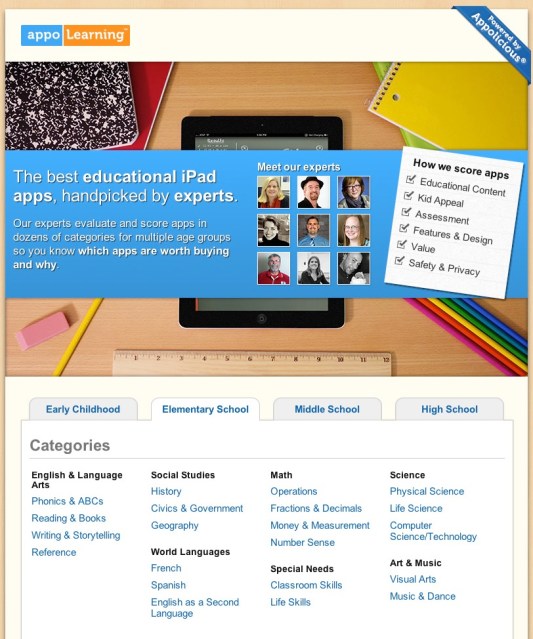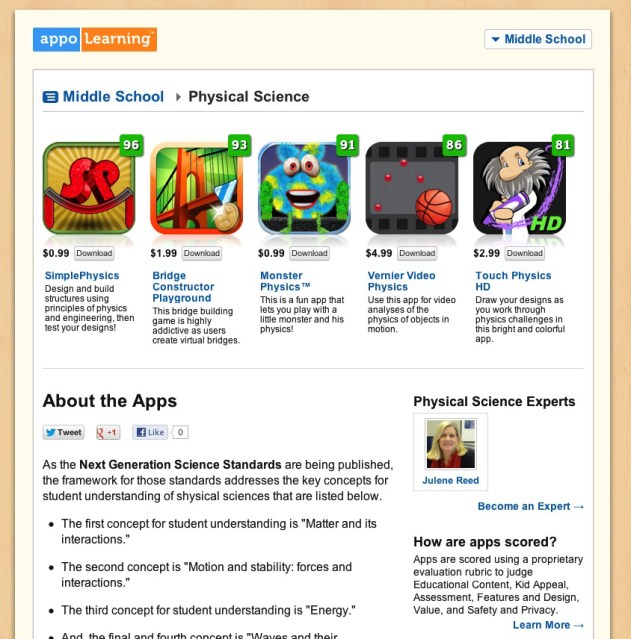Appolicious, the app search and discovery portal which helps users find new mobile applications for iPhone, iPad, and Android, is today launching a new service today aimed at parents, teachers and others in search of the best educational apps for children: appoLearning. This new resource is Appolicious’ attempt solving the inherent problems with app search today, starting with a focus on apps for learning.
“We realized that whenever you get into a deep, vertical area like education, the metaphor of search doesn’t work,” explains Appolicious founder Alan Warms. “First of all, search is very contextual – I’m not just looking for ‘an educational app,’ I’m looking for a ‘seventh grade app.’ Also, I need context. I need transparency. I need to understand why was this app is rated the way it’s rated, who rated it, and why should I trust this person?”
On appoLearning, those questions are answered. The site groups educational app recommendations into eighty-four categories, like “reading,” “number sense,” “life science,” “social interaction,” speaking and listening,” and many others, which are also grouped into stages including “Early Childhood (ages 2 1/2 – 5),” “Elementary School,” “Middle School,” and “High School.”
Within a section, a selection of five apps are shown, each rated on a scale out of 100. These are meant to represent the five best applications within that particular category, as chosen by an educational expert whose bio appears on the site, detailing their experience. This section also includes an explanation about why these apps and the skills they teach are important, also written by the educator.
To be clear, these app recommendations aren’t just chosen editorially – on the backend, app reviewers (who are paid contributors), must rate apps using a Q&A rating system designed by Appolicious meant to normalize the ratings process. For each application, reviewers have to analyze specific educational objectives on a scale of 1 to 3 – numbers which are totaled to give the app its final score. After rating all the apps within the category, the top five based on scores end up on display.
Many of the best apps here will likely end up being the paid apps, because they don’t bother the child with promotions, ads, or disruptive pushes to buy more content through in-app purchases. However, a comments section at the bottom of each app category page allows others to make suggestions as to how the list can be improved, or other applications people may like. These comments will be both vetted and monitored, helping to flag when the category may need a refresh.
A sixth spot for a paid, sponsored listing, clearly labeled as such, allows advertisers to promote their own apps to a very narrow target audience. This is available for $250 per week.
Warms says that the idea for this service occurred to him around six or so months ago, when his daughter was entering seventh grade. “I wanted to find an app for her that would help her practice fractions, decimals, and reciprocals. It was a horrific experience,” he says, explaining how difficult it was to determine which app or apps were of better quality.
But given the recent App Store turmoil surrounding AppGratis, and Apple’s ban of its app discovery service for apparently selling paid promotions, as well as Apple’s revised guidelines banning apps offering app discovery, it’s unclear how Apple would respond to a native app version of the appoLearning service, especially given its included sponsorships.
“We’ve talked to a lot of app developers in education, and they’re frustrated because it’s really hard for their apps to be discovered right now unless they’re popular,” Warms says. “This service, if it’s as successful as we hope it’s going to be, is going to be great news for Apple also because it’s good for their ecosystem.”
Warms admits, though, that the company is unsure of the rules here – as most app discovery publishers seem to be these days. Instead, for now, appoLearning has been designed with a responsive website that adapts to both mobile and tablet-sized screens.
Now that the site is launched, the plan is to now rapidly grown from its current 84 categories to reach around 150, each with its own educational expert contributor. The plan is to also adapt this same process into other verticals like travel, business, finance, health, and more. A move into Android will also follow.
Interested parents and teachers can now browse the site here. AppoLearning competes with a number of new entrants narrowly focused on educational app discovery, including KinderTown, YogiPlay, as well as other app discovery and search services.

